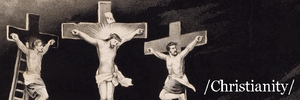>2 -Those who do not know the Gospel of Christ or his(sic) Church may too receive eternal salvation
>Catechism 846 & 847 http://www.vatican.va/archive/ENG0015/_P29.HTM
No, this is an error Feeney condemned as he fought against the modernists.
>-Q: why then is it being taught by the Roman church?
Modernism.
Let me summarize OBJECTIVELY the state of the question.
One or (arguably) Two Church Fathers opined in favor of a BoD: St. Augustine and St. Ambrose. Of these, St. Augustine was admittedly just speculating and forcefully retracted the opinion in his later, more mature, anti-Pelagian days (but BoDers never present those quotes). St. Ambrose's quote is ambiguous, and elsewhere in his work he too rejects BoD.
About a dozen or so Church Fathers promoted the notion of BoB. One of the earliest of these was St. Cyprian. Several other Church Fathers adopted the opinion from him. But St. Cyprian called BoB a Sacrament … which modern scholars consider an error. St. Cyprian also erred in advocating an opinion about re-baptism that was later condemned as heretical by the Church. Nevertheless, there's evidence that St. Cyprian considered BoB nothing more than an alternate mode of administering the SACRAMENT of Baptism. He stated that martyrs were washed in their blood while angels pronounced the words (of Baptism) – thus having blood stand in for water as matter for the Sacrament. So he did not consider BoB an exception to needing the Sacrament, but simply an alternate way of RECEIVING the Sacrament. Some of these Church Fathers, moreover, used the term BoB to refer to a SECOND Baptism for those who had already been Sacramentally baptized (one was speaking of a priest). But even then a dozen Church Fathers sharing an opinion, out of hundreds and hundreds of Church Fathers, does not rise to the level of establishing dogmatic consensus, a witness to Revealed Truth.
What the Church Fathers WERE absolutely unanimous about was the necessity of the Sacrament of Baptism for salvation and about the necessity of explicit faith in Jesus Christ for salvation (something which pernicious BoDers like LoT conveniently ignore).
In any case, for about 600 years you hear not another peep about BoD among Catholic authors.
Near the beginning of the pre-scholastic era, this question was picked up by two rival scholars, Abelard and Hugh of St. Victor. Abelard was against the notion and Hugh for it. Incidentally, Abelard was the first to reject another of St. Augustine's opinions, and the Church sided with him that St. Augustine had it wrong. Neither was aware of St. Augustine's later retraction of BoD … since not all of St. Augustine's copious works were readily available or in publication. Peter Lombard, who studied under both men, wrote to St. Bernard about it. St. Bernard responded that he would rather "err with Augustine" on this point than to be right on his own. Again, St. Bernard was unaware that St. Augustine had retracted the opinion. In any case, Peter Lombard went with it, due to St. Bernard's response, and it made it into his early scholastic theology manual The Sentences. St. Thomas studied these and adopted the opinion. And, of course, after St. Thomas, due to his authority, the opinion went viral.
Pope Innocent II and/or III (some dispute as to the authorship) opined in favor of this position "on the authority of Augustine and Ambrose" (note, not by their papal authority). But their explanations were muddled and contradictory (one of them completely contradicts St. Alphonsus' later position that those saved by BoD still have Purgatory time left). Not much after that until the alleged BoD passage in Trent. Misinterpretation of the passage in Trent gave further life to this opinion. Strangely, theology manuals used in seminaries after the Council of Trent still treated BoD as a "disputed question" among theologians. Then the 1917 Code of Canon Law promoted this possibility of salvation in the context of pastoral theology.
